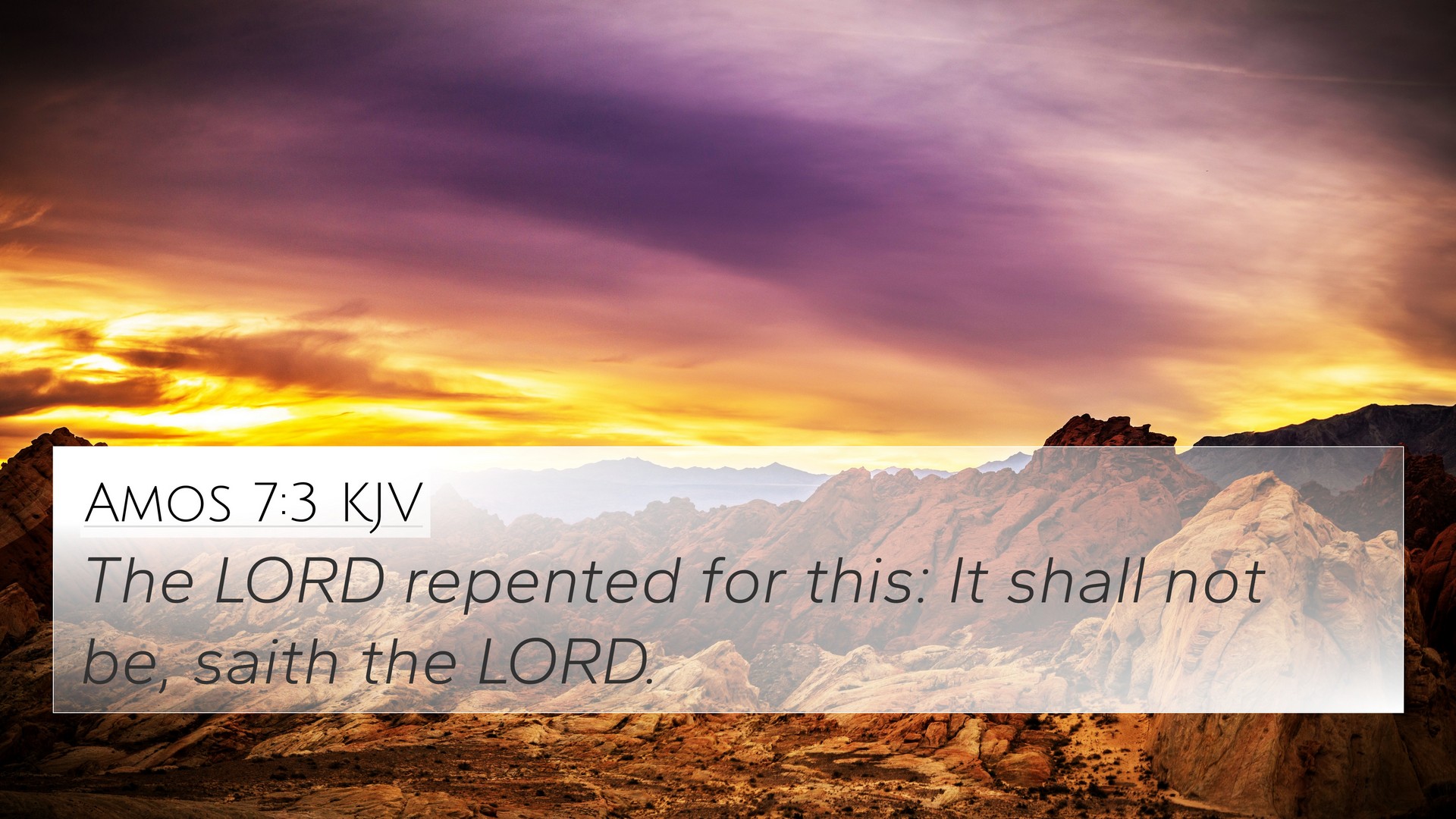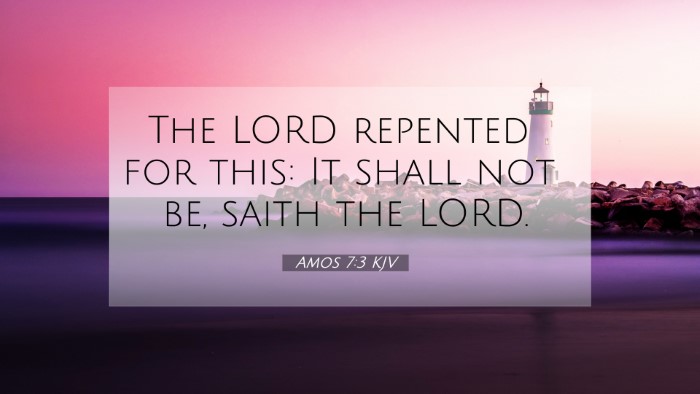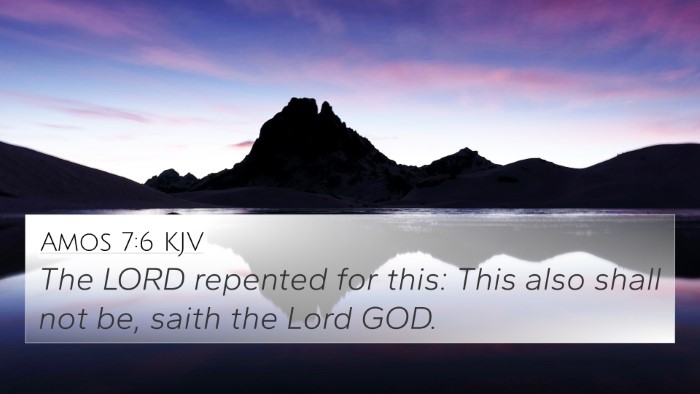Old Testament
Genesis Exodus Leviticus Numbers Deuteronomy Joshua Judges Ruth 1 Samuel 2 Samuel 1 Kings 2 Kings 1 Chronicles 2 Chronicles Ezra Nehemiah Esther Job Psalms Proverbs Ecclesiastes Song of Solomon Isaiah Jeremiah Lamentations Ezekiel Daniel Hosea Joel Amos Obadiah Jonah Micah Nahum Habakkuk Zephaniah Haggai Zechariah MalachiAmos 7:3 Similar Verses
Amos 7:3 Cross References
The LORD repented for this: It shall not be, saith the LORD.
Uncover the Rich Themes and Topics of This Bible Verse
Listed below are the Bible themes associated with Amos 7:3. We invite you to explore each theme to gain deeper insights into the Scriptures.
Amos 7:3 Cross Reference Verses
This section features a detailed cross-reference designed to enrich your understanding of the Scriptures. Below, you will find carefully selected verses that echo the themes and teachings related to Amos 7:3 KJV. Click on any image to explore detailed analyses of related Bible verses and uncover deeper theological insights.
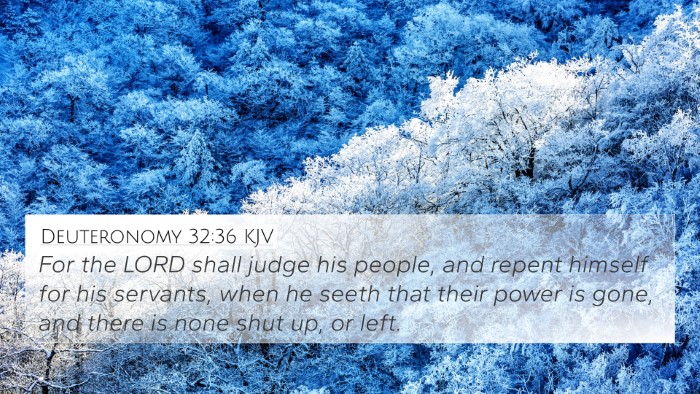
Deuteronomy 32:36 (KJV) »
For the LORD shall judge his people, and repent himself for his servants, when he seeth that their power is gone, and there is none shut up, or left.
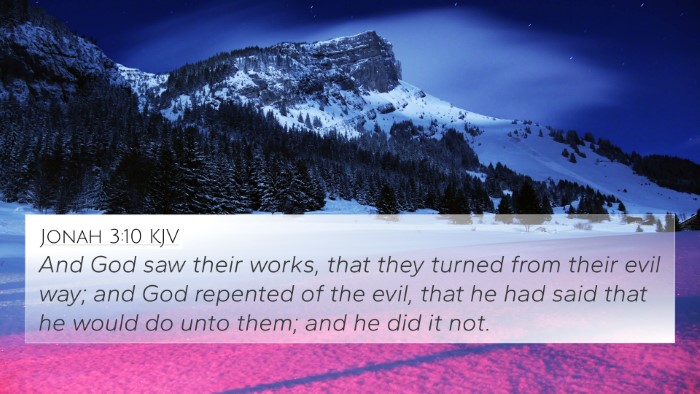
Jonah 3:10 (KJV) »
And God saw their works, that they turned from their evil way; and God repented of the evil, that he had said that he would do unto them; and he did it not.
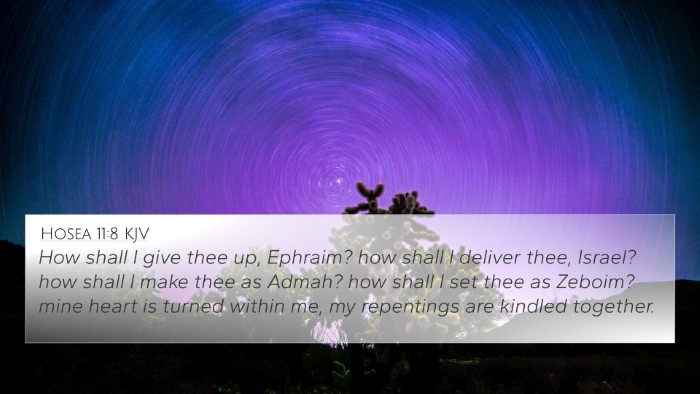
Hosea 11:8 (KJV) »
How shall I give thee up, Ephraim? how shall I deliver thee, Israel? how shall I make thee as Admah? how shall I set thee as Zeboim? mine heart is turned within me, my repentings are kindled together.
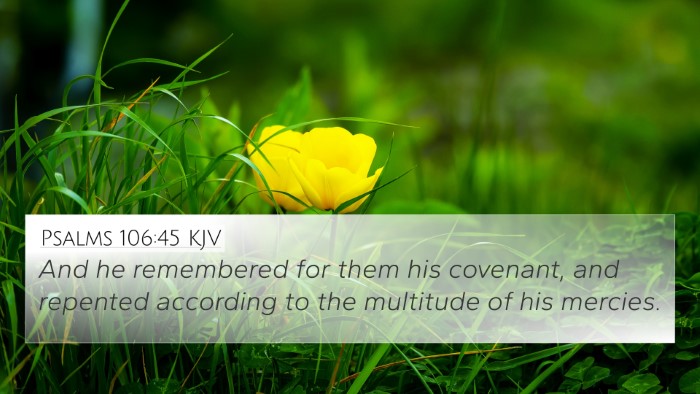
Psalms 106:45 (KJV) »
And he remembered for them his covenant, and repented according to the multitude of his mercies.

Joel 2:14 (KJV) »
Who knoweth if he will return and repent, and leave a blessing behind him; even a meat offering and a drink offering unto the LORD your God?

1 Chronicles 21:15 (KJV) »
And God sent an angel unto Jerusalem to destroy it: and as he was destroying, the LORD beheld, and he repented him of the evil, and said to the angel that destroyed, It is enough, stay now thine hand. And the angel of the LORD stood by the threshingfloor of Ornan the Jebusite.
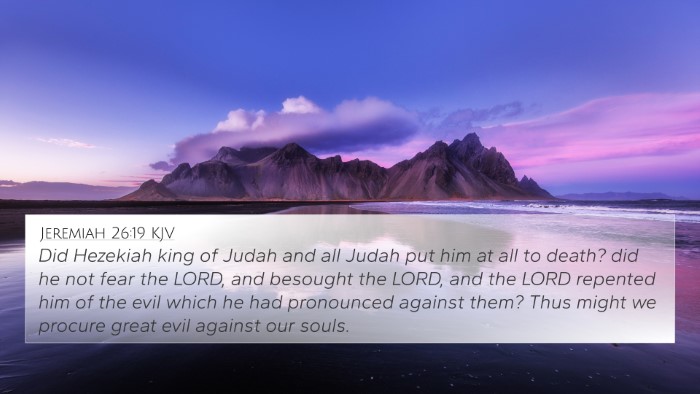
Jeremiah 26:19 (KJV) »
Did Hezekiah king of Judah and all Judah put him at all to death? did he not fear the LORD, and besought the LORD, and the LORD repented him of the evil which he had pronounced against them? Thus might we procure great evil against our souls.
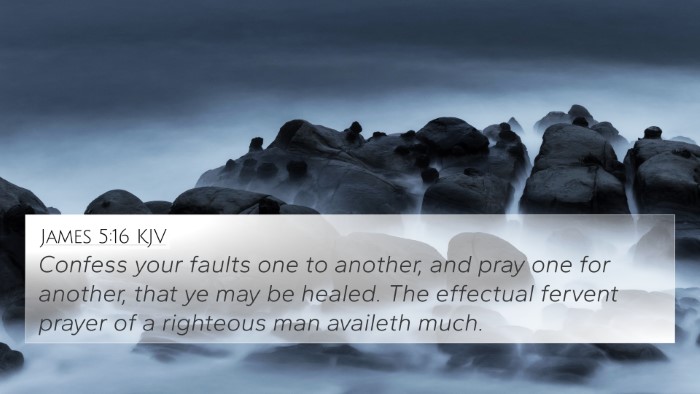
James 5:16 (KJV) »
Confess your faults one to another, and pray one for another, that ye may be healed. The effectual fervent prayer of a righteous man availeth much.
Amos 7:3 Verse Analysis and Similar Verses
Understanding Amos 7:3
Amos 7:3 states, "The LORD relented concerning this: ‘It shall not be,’ said the LORD." This verse provides profound insights into God's nature and His responses to intercession, judgment, and mercy.
General Overview
In the context of Amos, this verse appears during a prophetic vision where God shows Amos the impending judgment on Israel. The dialogue reflects the significant theme of divine mercy prevailing over judgment, illustrating how sincere intercession can lead to God's reconsideration of His declarations.
Insights from Public Domain Commentaries
Matthew Henry's Commentary
Matthew Henry emphasizes the mercy of God during moments of impending judgment. He notes that God's relenting shows a response to the pleas of His prophets and the genuine repentance of His people. This highlights a theme prevalent throughout scripture: God's willingness to forgive when His people turn back to Him.
Albert Barnes' Notes
Albert Barnes builds on the themes of intercession and divine sovereignty. He points out that God's relenting signifies more than mere change; it indicates His desire for His people to return to Him and maintain a faithful relationship. Barnes also reflects on the idea that God’s initial intentions are not immutable, as His character remains consistent in offering grace.
Adam Clarke's Commentary
Adam Clarke provides an interpretative lens that views Israel's condition as a backdrop to this divine response. He notes that God's relenting underscores the significance of prayer and intercession as powerful tools for influencing divine decisions. Clarke also voices the importance of understanding God's nature as it relates to justice and mercy.
Cross-References
Amos 7:3 relates to several key Bible verses, reinforcing the concepts of judgment, mercy, and intercession. Here are some notable cross-references:
- Exodus 32:14 - God's relenting from evil based on Moses' intercession.
- Jeremiah 18:7-10 - The ability of a nation to avert disaster through repentance.
- Ezekiel 18:30-32 - Encouragement for a nation to turn from sin to receive life.
- James 5:16 - The power of a righteous person's prayer to effect changes.
- 2 Chronicles 7:14 - God's promise to hear and heal if His people humble themselves.
- 1 John 1:9 - Assurance of forgiveness upon confession of sin.
- Luke 18:1-8 - The parable of the persistent widow demonstrating the importance of persistent prayer.
- Romans 11:22 - The balance of God's kindness and severity.
- Isaiah 55:7 - A call for the wicked to forsake their ways and return to God for mercy.
- Psalm 103:8-12 - God's mercy and willingness to forgive sins abundantly.
Thematic Connections
The thematic connections within the Bible reveal a consistent portrayal of God's character throughout scriptures. The understanding of Amos 7:3 extends to numerous other texts that depict God's mercy in response to prayers and repentance. These draw clear parallels between the prophets' appeals and God's responses.
Categorizing Importance
When conducting a comparative Bible verse analysis, the connections between Isaiah, Jeremiah, and the New Testament writings reveal the continuity of God's message regarding mercy and intercession. The ability for individuals and nations to alter their fates through sincere repentance illustrates a vital component of faith.
Tools for Bible Cross-Referencing
Utilizing tools like a Bible concordance or a cross-reference Bible study guide can greatly enhance one's understanding of inter-Biblical dialogue. These resources help in identifying connections between Old and New Testaments, as well as understanding the implications of similar themes across different scriptures.
Conclusion
In Amos 7:3, we find a rich tapestry of God's justice intermixed with the profound depths of His mercy. Through cross-referencing this verse with others, we see a unified narrative of God's character that invites His people to seek Him genuinely and experience His grace. This verse serves as a poignant reminder that while God's judgments may be firm, His love and mercy prevail, provided we turn back to Him.
